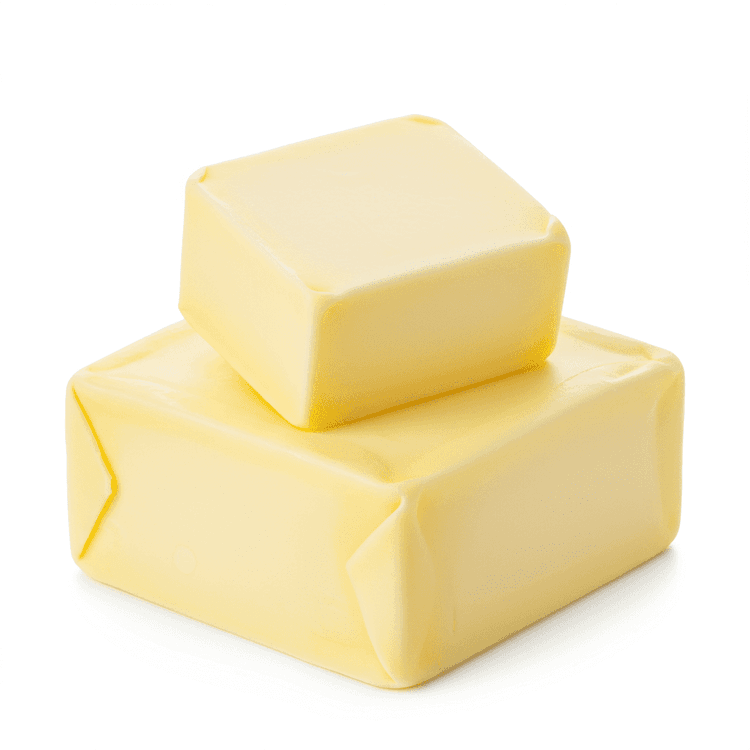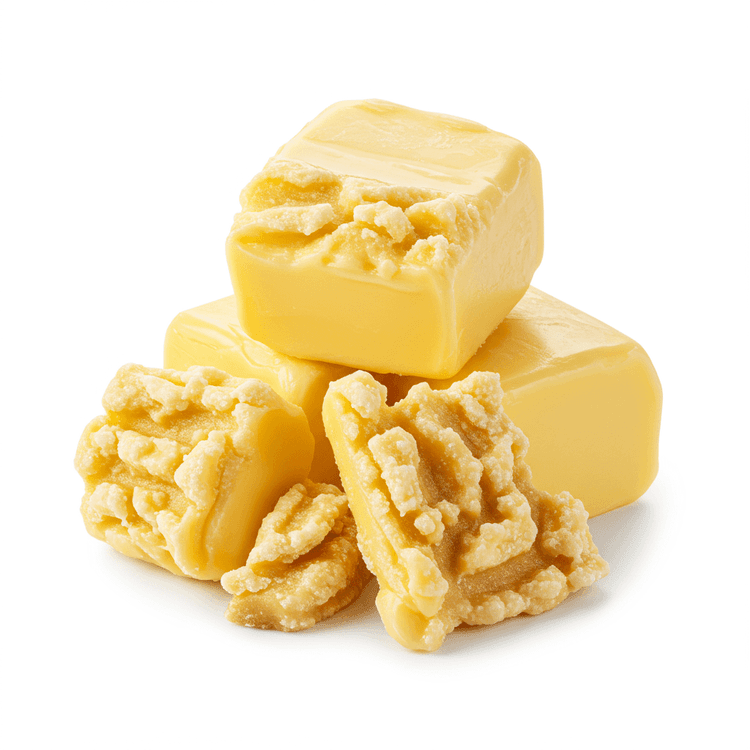
Butter
Butter is a solid dairy product made from the fat and protein components of churned cream or milk. It boasts a rich, creamy, and slightly sweet flavor, lending itself beautifully to both sweet and savory dishes. Its texture is smooth and easily spreadable at room temperature, becoming firm when refrigerated. Good quality butter has a pale-yellow appearance and a characteristic aroma that enhances various culinary creations. It is a versatile ingredient widely used in baking, cooking, and as a spread, and is also a great source of fat-soluble vitamins.
Common Uses
- Use butter as a flavorful spread on toast, bread, crackers, or muffins. The rich, creamy taste enhances simple snacks and appetizers.
- Incorporate butter into baked goods like cookies, cakes, and pastries to add moisture, tenderness, and a golden-brown color. Butter's fat content creates a delicate crumb and enhances the overall texture.
- Sauté vegetables, meats, or seafood in butter to impart a rich, savory flavor. The butter creates a flavorful base for sauces and glazes, adding depth to the dish.
- Melt butter and drizzle it over popcorn, pasta, or steamed vegetables for a quick and easy flavor boost. A touch of butter adds richness and complements the natural flavors of the ingredients.
- Cream butter with sugar to create the base for many desserts. The creamy mixture traps air, providing a light and airy texture to the finished product.
- Use butter to make sauces like beurre blanc or hollandaise. Its emulsifying properties create smooth and decadent sauces that pair well with vegetables, fish, and eggs.
Nutrition (per serving)
Nutrition (per serving)
Calories
717.0kcal (35.85%)
Protein
0.8g (1.7%)
Carbs
0.0g
Sugars
0.1g (0.12%)
Healthy Fat
24.3g
Unhealthy Fat
54.6g
% Daily Value based on a 2000 calorie diet
Nutrition (per serving)
Calories
717.0kcal (35.85%)
Protein
0.8g (1.7%)
Carbs
0.0g
Sugars
0.1g (0.12%)
Healthy Fat
24.3g
Unhealthy Fat
54.6g
% Daily Value based on a 2000 calorie diet
Health Benefits
- Provides fat-soluble vitamins like A, D, E, and K, essential for various bodily functions.
- Contains butyrate, a short-chain fatty acid that promotes gut health and reduces inflammation.
- Source of conjugated linoleic acid (CLA), which may have potential benefits for weight management and muscle building.
- Offers a concentrated source of energy due to its high fat content.
- Can enhance the absorption of nutrients when consumed with other foods.
Substitutes
Chefadora AI is here.
Experience smarter, stress-free cooking.
Storage Tips
Butter should be stored properly to prevent it from going rancid or absorbing odors. For short-term storage (1-2 weeks), keep butter in its original packaging or an airtight container in the refrigerator. For longer storage (up to several months), wrap the butter tightly in freezer-safe wrap or place it in a freezer bag, then freeze it. Avoid storing butter near strong-smelling foods in the refrigerator, as it can easily absorb those odors. Salted butter generally has a longer shelf life than unsalted butter.
Marnirni-apinthi Building, Lot Fourteen,
North Terrace, Adelaide, South Australia, 5000
Australia

